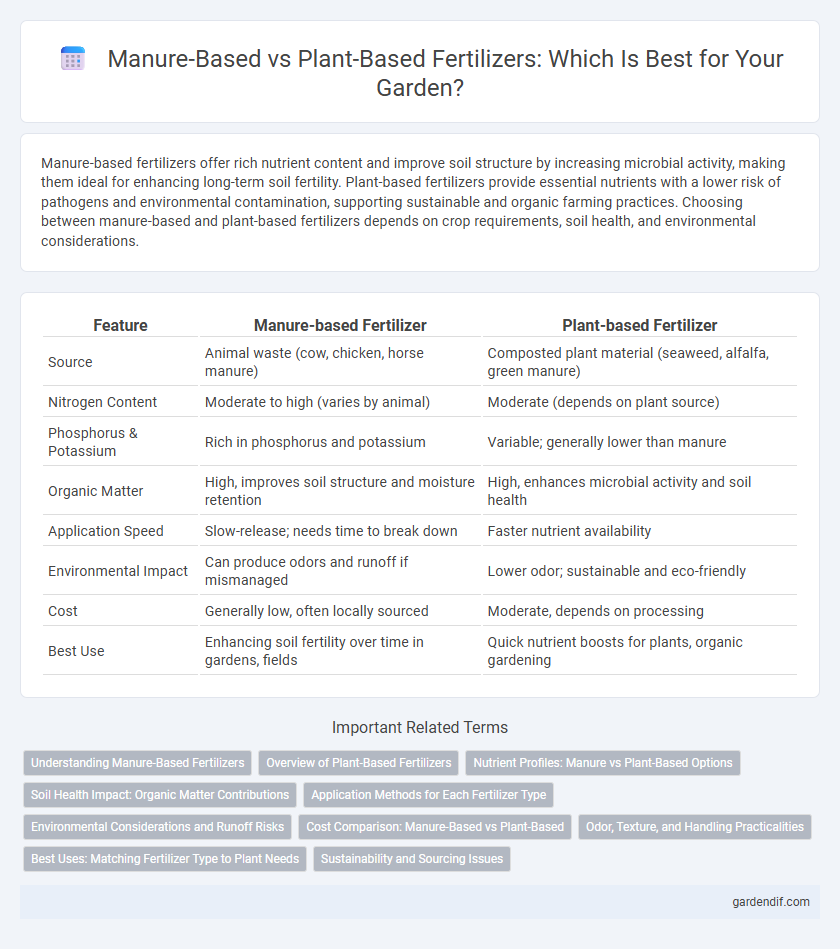
Manure-based vs plant-based Illustration
Manure-based fertilizers offer rich nutrient content and improve soil structure by increasing microbial activity, making them ideal for enhancing long-term soil fertility. Plant-based fertilizers provide essential nutrients with a lower risk of pathogens and environmental contamination, supporting sustainable and organic farming practices. Choosing between manure-based and plant-based fertilizers depends on crop requirements, soil health, and environmental considerations.
Table of Comparison
| Feature | Manure-based Fertilizer | Plant-based Fertilizer |
|---|---|---|
| Source | Animal waste (cow, chicken, horse manure) | Composted plant material (seaweed, alfalfa, green manure) |
| Nitrogen Content | Moderate to high (varies by animal) | Moderate (depends on plant source) |
| Phosphorus & Potassium | Rich in phosphorus and potassium | Variable; generally lower than manure |
| Organic Matter | High, improves soil structure and moisture retention | High, enhances microbial activity and soil health |
| Application Speed | Slow-release; needs time to break down | Faster nutrient availability |
| Environmental Impact | Can produce odors and runoff if mismanaged | Lower odor; sustainable and eco-friendly |
| Cost | Generally low, often locally sourced | Moderate, depends on processing |
| Best Use | Enhancing soil fertility over time in gardens, fields | Quick nutrient boosts for plants, organic gardening |
Understanding Manure-Based Fertilizers
Manure-based fertilizers are rich in essential nutrients such as nitrogen, phosphorus, and potassium, derived from animal waste that enhances soil fertility and microbial activity. Unlike plant-based fertilizers, manure provides organic matter that improves soil structure and moisture retention while slowly releasing nutrients over time for sustained plant growth. Proper composting of manure reduces pathogens and odors, making it a valuable, eco-friendly option for enriching agricultural soils.
Overview of Plant-Based Fertilizers
Plant-based fertilizers, derived from sources such as seaweed, composted leaves, and green manure crops, offer a sustainable alternative to traditional manure-based fertilizers. Rich in essential nutrients like nitrogen, phosphorus, and potassium, these organic fertilizers enhance soil structure, promote microbial activity, and improve water retention. Their rapid biodegradability and lower environmental impact make plant-based fertilizers ideal for eco-friendly agricultural practices and organic farming.
Nutrient Profiles: Manure vs Plant-Based Options
Manure-based fertilizers offer high levels of nitrogen, phosphorus, and potassium, essential for robust plant growth and soil health, while also improving soil organic matter content. Plant-based fertilizers typically provide a balanced nutrient profile with slower nutrient release rates, enhancing long-term soil fertility without the risk of nutrient burn. Evaluating nutrient profiles helps determine the best choice for specific agricultural needs, balancing immediate nutrient availability with sustainable soil management.
Soil Health Impact: Organic Matter Contributions
Manure-based fertilizers significantly enhance soil health by adding high levels of organic matter that improve soil structure, water retention, and microbial activity. Plant-based fertilizers contribute organic matter primarily through decomposable residues, enriching soil carbon and supporting diverse soil biota. Both types play crucial roles in maintaining long-term soil fertility and ecosystem balance, with manure providing more readily available nutrients and plant-based sources promoting sustainable nutrient cycling.
Application Methods for Each Fertilizer Type
Manure-based fertilizers are typically applied through soil incorporation or surface spreading to enhance nutrient release and microbial activity. Plant-based fertilizers are often used as mulch or liquid extracts, allowing for gradual nutrient absorption and improved soil organic matter. Selecting the appropriate application method influences nutrient availability, soil health, and crop yield efficiency.
Environmental Considerations and Runoff Risks
Manure-based fertilizers provide essential nutrients and improve soil structure but pose higher environmental risks due to potential nitrogen and phosphorus runoff, which can contaminate water bodies and promote algal blooms. Plant-based fertilizers typically have lower nutrient concentrations but reduce the risk of harmful runoff and are often more sustainable, promoting soil biodiversity without contributing to excessive nutrient leaching. Proper management practices are crucial for both types to minimize environmental impacts and maintain ecosystem health.
Cost Comparison: Manure-Based vs Plant-Based
Manure-based fertilizers generally offer a lower cost per nutrient unit compared to plant-based options, making them a budget-friendly choice for large-scale agricultural operations. Plant-based fertilizers, while often more expensive, provide valuable organic matter and specific micronutrients that enhance soil structure and fertility over time. Cost-effectiveness depends on factors such as nutrient content, availability, transportation, and application methods.
Odor, Texture, and Handling Practicalities
Manure-based fertilizers often have a strong odor and a moist, coarse texture that requires careful handling to prevent spills and contamination. Plant-based fertilizers typically emit a milder smell and present a finer, drier texture, making them easier to apply and store. Both types demand specific practical considerations: manure-based products need proper curing to reduce odor, while plant-based fertilizers benefit from crumbly consistency for efficient dispersal.
Best Uses: Matching Fertilizer Type to Plant Needs
Manure-based fertilizers are rich in nitrogen, phosphorus, and potassium, making them ideal for nutrient-demanding crops like vegetables and fruit trees that require sustained nutrient release. Plant-based fertilizers, often high in micronutrients and organic matter, best suit leafy greens, herbs, and root vegetables that benefit from improved soil structure and moisture retention. Matching fertilizer type to specific plant nutrient needs maximizes growth efficiency and supports long-term soil health.
Sustainability and Sourcing Issues
Manure-based fertilizers provide essential nutrients and improve soil organic matter but face challenges in sourcing due to livestock production's environmental impact and potential emissions of methane and nitrous oxide. Plant-based fertilizers offer renewable and biodegradable options derived from crop residues or cover crops, promoting sustainable nutrient cycling with lower greenhouse gas emissions. Both types require careful management to balance nutrient availability, minimize environmental risks, and support sustainable agricultural practices.
Manure-based vs plant-based Infographic

 gardendif.com
gardendif.com